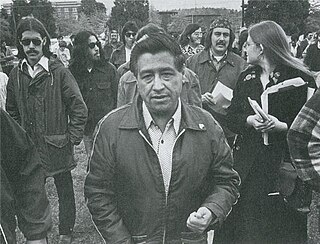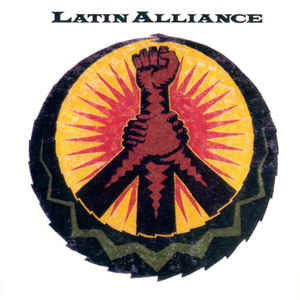Related Research Articles
Aztlan Underground is a band from Los Angeles, California that combines Hip-Hop, Punk Rock, Jazz, and electronic music with Chicano and Native American themes, and indigenous instrumentation. They are often cited as progenitors of Chicano rap.

Chicano or Chicana is an ethnic identity for Mexican Americans who have a non-Anglo self-image, embracing their Mexican Native ancestry. Chicano was originally a classist and racist slur used toward low-income Mexicans that was reclaimed in the 1940s among youth who belonged to the Pachuco and Pachuca subculture. In the 1960s, Chicano was widely reclaimed in the building of a movement toward political empowerment, ethnic solidarity, and pride in being of indigenous descent. Chicano developed its own meaning separate from Mexican American identity. Youth in barrios rejected cultural assimilation into whiteness and embraced their own identity and worldview as a form of empowerment and resistance. The community forged an independent political and cultural movement, sometimes working alongside the Black power movement.

Chicano rap is a subgenre of hip hop that embodies aspects of the Mexican American or Chicano culture.

Horno is a mud adobe-built outdoor oven used by the Native Americans and the early settlers of North America. Originally introduced to the Iberian Peninsula by the Moors, it was quickly adopted and carried to all Spanish-occupied lands. The horno has a beehive shape and uses wood as the heat source. The procedure, still used in parts of New Mexico and Arizona, is to build a fire inside the horno and, when the proper amount of time has passed, remove the embers and ashes and insert the bread to be cooked. In the case of corn, the embers are doused with water and the corn is then inserted into the horno to be steam-cooked. When cooking meats, the oven is fired to a "white hot" temperature, the coals are moved to the back of the oven, and the meats are placed inside. The smoke hole and door are sealed with mud. A twenty-one-pound turkey takes 21⁄2 to 3 hours to be cooked.
Alvin Lowell Trivette, known as A.L.T., is an American rapper. known for the 1991 hit "Lowrider " and the 1992 hit "Tequila".

Akwid is a Chicano rap group. Brothers Francisco "AK" Gómez and Sergio "Wikid" Gómez, who make up Akwid, are originally from Jiquilpan, Michoacán, but grew up in Los Angeles, California. Before becoming Akwid both "AK" and "Wikid" were part of a former rap group named the "Head Knockerz" with other group members Sabu and John Doe

The Brown Berets is a pro-Chicano paramilitary organization that emerged during the Chicano Movement in the late 1960s. David Sanchez and Carlos Montes co-founded the group modeled after the Black Panther Party. The Brown Berets was part of the Third World Liberation Front. It worked for educational reform, farmworkers' rights, and against police brutality and the Vietnam War. It also sought to separate the American Southwest from the control of the United States government.

The Chicano Movement, also referred to as El Movimiento, was a social and political movement in the United States that worked to embrace a Chicano/a identity and worldview that combated structural racism, encouraged cultural revitalization, and achieved community empowerment by rejecting assimilation. Chicanos also expressed solidarity and defined their culture through the development of Chicano art during El Movimiento, and stood firm in preserving their religion.

Chicano/a studies, also known as Chican@ studies, originates from the Chicano Movement of the late 1960s and 1970s, and is the study of the Chicana/o and Latina/o experience. Chican@ studies draws upon a variety of fields, including history, sociology, the arts, and Chican@ literature. The area of studies additionally emphasizes the importance of Chican@ educational materials taught by Chican@ educators for Chican@ students.
Estevan Oriol is a photographer and director from Los Angeles, of Mexican-Italian descent. Best known for his distinct, gritty 35mm black and white work, documenting chicano, cholo culture, as well as celebrities within film and hip-hop, and lingerie work, his images have been featured in magazines, on album covers and in exhibitions across the world. Oriol is also known for directing several music videos for the likes of Blink 182, D12, Cypress Hill and more, as well as for his partnerships with life-long friend and collaborator, Mister Cartoon for Joker Brand Clothing and Soul Assassins Studios, the latter of which the two opened together by way of Cypress Hill's producer, DJ Muggs.

Latin Alliance is the self-titled studio album by a one-off collaboration of Chicano rappers. The group was formed in 1989 and released their one and only album in 1991 via Virgin Records. It features performances by Kid Frost, A.L.T., Markski, Rayski Rockswell, Mellow Man Ace, Lyrical Engineer, Hip Hop Astronaut and The Lyrical Latin, with guest appearances by WAR and Scoop DeVille. Recording sessions took place at Digital Sound & Picture in New York City, Skyline Recording in Topanga, Wide Tracks, Image Recorders and Echo Sound in Los Angeles. Production was handled by Kid Frost, Tony G, Will Roc, Todd Alexander, Ralph Rivers, The Baka Boyz, Julio G, Geoff Rios and Mike Greene.
Misogyny in rap music refers to lyrics, videos, or other aspects of rap music that support, glorify, justify, or normalize the objectification, exploitation, or victimization of women. It is an ideology that portrays women as objects for men's ownership, use, or abuse. It diminishes women to expendable beings. It can range from innuendoes to stereotypical characterizations and defamations.

Here Come the Horns is the second studio album by the American hip hop group Delinquent Habits.

Freedom Band is the fourth studio album by American Latin hip hop group Delinquent Habits, released in 2003. The single, "U Don't Own Me", samples Lesley Gore's notable song.

Emma Pérez is an American author and professor, known for her work in queer Chicana feminist studies.

Xicanx is an English-language gender-neutral neologism and identity referring to people of Mexican descent in the United States. The ⟨-x⟩ suffix replaces the ⟨-o/-a⟩ ending of Chicano and Chicana that are typical of grammatical gender in Spanish. The term references a connection to Indigeneity, decolonial consciousness, inclusion of genders outside the Western gender binary imposed through colonialism, and transnationality. In contrast, most Latinos tend to define themselves in nationalist terms, such as by a Latin American country of origin.

"La Familia" is a song by American rapper Frost and the second single from his third studio album Smile Now, Die Later (1995). Produced by Tony G and Julio G, it samples elements from "Family Affair" by Sly and the Family Stone and features vocals from Rich Garcia.

Blaxicans are Americans who are both Black and Mexican American descent. Some may prefer to identify as Afro-Chicano or Black Chicana/o and embrace Chicano identity, culture, and political consciousness. Most Blaxicans have origins in working class community interactions between African Americans and Mexican Americans. Los Angeles has been cited as the hub for Blaxican culture. In 2010, it was recorded that 42,000 people in Los Angeles County identified as both Black and Latino, most of whom are believed to be both Black and Mexican American.
"No Sunshine" is a song by American rapper Kid Frost and the lead single from his second studio album East Side Story (1992). Produced by Mr. Mixx, it contains a sample of "Ain't No Sunshine" by Bill Withers and features uncredited vocals from Prince Teddy.

"East Side Rendezvous" is a song by American rapper Frost. It is the lead single from his third studio album Smile Now, Die Later (1995) and features rappers A.L.T. and O.G.Enius and singer Diane Gordon. It was produced by Monte Carlo.
References
- ↑ McFarland, Louis Pancho (October 2000). "Coming Full Circle". Colorado College. Retrieved January 28, 2024.
- ↑ "Hyper-Masculine and Misogynist Violence in Chicano Rap". Bad Subjects (61). September 2002.
- ↑ "Former "b-boy" leaves his mark". Chicago State University. 2019. Retrieved January 27, 2024.
- ↑ McFarland, Pancho. "Okichike Ka Centeotzintli: Reindigenization in the City". About Place. 5 (1). Retrieved January 27, 2024.
- ↑ Boudreault-Fournier, Alexandrine (2010). "Review of Chicano Rap: Gender and Violence in the Postindustrial Barrio, by P. McFarland". Popular Music. 29 (2): 301–303. doi:10.1017/S0261143010000103. JSTOR 40926925.
- ↑ LeBrón, Marisol (2011). "Chicano rap: Gender and violence in the post-industrial Barrio Book Review". Latino Studies. 9: 351–353. doi:10.1057/lst.2011.28.
- ↑ Garcia, Justin D. (June 2016). "The Chican@ Hip Hop Nation: Politics of a New Millennial Mestizaje". The Journal of American Culture. 39 (2): 242–243. ProQuest 1852700068.
- ↑ Celentano, Luigi (2020). "Toward a Chican@ Hip Hop Anti-Colonialism". Anarchist Studies. 28 (2).
- ↑ Kovic, C. M. (August 2018). "Mexican-origin foods, foodways, and social movements: decolonial perspectives". CHOICE: Current Reviews for Academic Libraries. 55 (12).
- ↑ Santizo, Natalie (2019). "Review: Mexican-Origin Foods, Foodways, and Social Movements: Decolonial Perspectives, by Devon G. Peña, Luz Calvo, Pancho McFarland, and Gabriel R. Valle". Aztlán. 44 (1): 273–277. doi:10.1525/azt.2019.44.1.273.